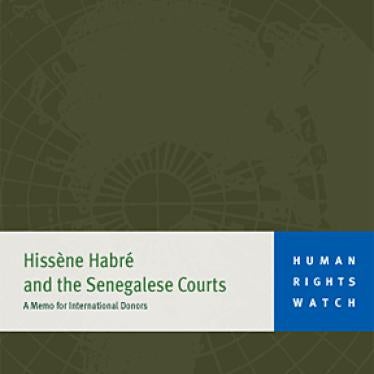(Dakar, Senegal) - A Senegalese court today indicted the exiled dictator of Chad, Hissein Habre, on torture charges, and placed him under house arrest.
It is the first time that a former African head of state has been indicted for atrocities by the courts of another country. Habre has lived in exile in Senegal since his ouster in 1990.
"This is a stunning victory for the Chadian people and for torture victims all over the world," said Reed Brody, Advocacy Director of Human Rights Watch, one of the organizations which initiated the criminal action last week. "Today's indictment is a wake-up call to dictators in Africa and elsewhere, that if they commit similar atrocities they could also be brought to justice one day."
In papers presented to Judge Kandji, Human Rights Watch and the other groups provided details of 97 political killings, 142 cases of torture, 100 "disappearances," and 736 arbitrary arrests, most carried out by Habre's dreaded DDS (Documentation and Security Directorate). The groups also furnished documents describing how Habre placed the DDS under his direct supervision, staffed it with his close friends, and required that it report regularly to him.
Seven individual Chadians and one Frenchwoman whose Chadian husband was killed by Habre's regime are acting as private plaintiffs, as is the Chadian Association of Victims of Political Repression and Crime (AVCRP), which represents 792 victims of Habre's brutality.
The Chadian plaintiffs were jubilant at today's decision "Our pleas have been answered," said Samuel Togoto, 53, who was beaten in prison while his hands and feet were tightly bound together behind his back, a common torture known as the "Arbatachar.""This is one of the happiest days of my life."
Younous Mahadjir, 47, Vice-President of the Chadian Labor Confederation, who was also subjected to the "Arbatachar,"said that the judge's ruling was a "triumph for those who are no longer with us. Today, my friends who were tortured, the people I saw die in jail, have finally achieved some justice."
Habre, who appeared before Judge Kandji this afternoon to hear his indictment, remains in his villa on the outskirts of Dakar, which is now guarded by Senegalese gendarmes.
Habre, 57, took power in Chad in 1982, overthrowing the government of Goukouni Wedeye. Habre's one-party regime, supported by the United States and France, was marked by widespread abuse and campaigns against the ethnic Hadjerai (1987) and the Zaghawa (1989). Habre was deposed in December 1990 by current president Idriss Deby, who had been his army chief of staff.
A 1992 truth commission accused Habre's regime of 40,000 political murders and 200,000 cases of torture and of stealing $11.6 million from the Chadian treasury. With many ranking officials of the Deby government, including Deby himself, involved in Habre's crimes, however, the new government did not pursue Habre's extradition.
"Senegal can hold its head up high today," said Alioune Tine of the Dakar-based African Assembly for the Defense of Human Rights (RADDHO)."My country is setting an example for Africa by showing that Africans can take care of their own problems. The time when brutal despots could just take their bank accounts and move next door is coming to an end."
Among those who also testified before Judge Kandji were Sabadet Totodet, a former prisoner who was ordered by the DDS to dig mass graves to bury Habre's opponents, and Ramadane Souleymane, whose brother, a regional lieutenant governor, was arrested and "disappeared" in Habre's campaign against the Hadjerai.
The effort to prosecute Habre was inspired by the case against Gen. Augusto Pinochet, said Brody of Human Rights Watch, which participated in the Pinochet hearings before the British House of Lords. Human Rights Watch sent investigators to Chad to prepare the documentation and witness testimony which was presented to the Dakar court.
"The Pinochet case reaffirmed the principles of international law that a country can judge the crime of torture no matter where the acts were committed, and that not even a former head of state has immunity from prosecution," said Brody. "But it also showed us that there are countries where these lofty principles can actually be applied in practice. Senegal can now be counted among those countries."
Joining Human Rights Watch and RADDHO in support of the complaint were the Chadian Association for the Promotion and Defense of Human Rights (ATPDH), the Chadian League for Human Rights (LTDH), the National Organization for Human Rights (Senegal), the London-based Interights, the International Federation of Human Rights Leagues (FIDH) and the French organization Agir Ensemble pour les Droits de l'Homme.






